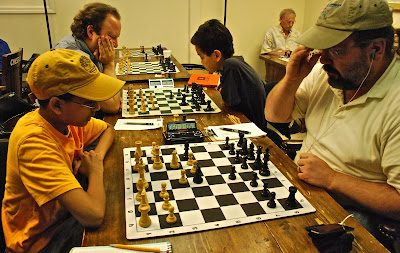Mikhail Tal: November 9, 1936 – June 28, 1992
GM Mikhail Tal, Boylston Chess Club, City Club of Boston, 1988 Photo: Steve Stepak
Mikhail Tal won the World Chess Championshipin 1960, at the age of 26,
from Mikhail Botvinnik. The contract stated that should he lose the match, Botvinnik
was guaranteed a rematch the next year. Unfortunately for Tal, this was
a hardship. Born with only one kidney to begin with, Tal was ailing from a serious
bout of kidney disease. A chain smoker and a heavy drinker (vodka, or anything
strong) Tal taxed his body to the limits. Always a gentleman, Botvinnik did
offer Tal a postponement of the match to recover from his illness. Tal declined the
offer. Always a fighter, when I asked Tal (in 1988) why he didn't take
Botvinnik up on his offer of postponement, Misha replied shrugging his
shoulders: I was young then; all I wanted to do was to play chess!
in 1988, Tal won the World Blitz Chess Championship in St. John New Brunswick,
Canada, ahead of Kasparov and Karpov. Never before in the USA due to travel
restrictions by USSR officials (during the cold war) Tal came to Boston, then Framingham
(Veterans Club) to give simuls: the first two American cities to greet the chess champion.
The Boylston Chess Club was the first to host Tal. I was lucky enough
to spend an hour talking to Tal (he arrived early to the simul event...) I asked Misha
about his rematch and also about Fischer's chances of winning the World Chess
Championship from Karpov. After all there was no one alive in 1988 that knew
Fischer better, socially or chessically. Tal had a +4 -2 =2 record over Bobby.
Tal's assessment: Fischer would have won for sure in 1975; not so sure in 1978.
I offer two games from the Tal-Botvinnik rematch 1961:
Botvinnik – Tal, Moscow [World Chess Championship, m=17] 1961
1.d4 g6 2.e4 Bg7 3.c4 d6 4.Nc3 Nf6 5.f3 Nbd7 6.Be3 O-O
7.Bd3 e5 8.Nge2 Nh5 9.dxe5 dxe5 10.O-O c6 11.Qd2 Qe7
12.Rad1 Nc5 13.Bb1 Ne6 14.Qe1 Bf6 15.Kh1 Nhf4 16.g3 Nxe2
17.Nxe2 h5 18.Qf2 b6 19.f4 exf4 20.gxf4 Bb7 21.e5 c5
22.Rd5 Bg7 23.Kg1 Nc7 24.Nc3 Nxd5 25.cxd5 Rad8 26.Be4 Ba8
27.Qg3 b5 28.Qf2 Qd7 29.Bxc5 Rfe8 30.Qg3 Rc8 31.b4 Kh8
32.Qf3 a6 33.Kh1 f5 34.exf6 Bxf6 35.Bxg6 Qg4 36.Qd3 Rg8
37.Be4 Rce8 38.Bf3 Qxf4 39.Ne2 Qh4 40.Bf2 Qg5 41.Ng3 Rd8
42.Be3 Qe5 43.Rd1 Rg4 44.a3 Bb7 45.Bb6 Rd7 46.Be3 Rh4
47.Nf1 Rc4 48.Bg2 Rg7 49.Qd2 h4 50.h3 Qb2 51.Qxb2 Bxb2
52.Bc5 Rd7 53.Ne3 Rc1 54.Rxc1 Bxc1 55.Bd4+ Kg8 56.Ng4 Bg5
57.Kg1 Bxd5 58.Ne5 Bxg2 59.Nxd7 Bxh3 60.Nc5 Bc8 61.Kf2 Kh7
62.a4 bxa4 63.Nxa4 Bf4 64.Kf3 h3 65.Bg1 h2 66.Bxh2 Bxh2
67.Ke4 Bd7 68.Nc5 Bb5 69.Kd5 Kg6 70.Ne4 Kf5 71.Nc3 Bf1
72.Kc5 Be5 73.Nb1 Ke6 74.Nd2 Bd6+ 75.Kb6 Bg2 76.Nb3 Bxb4
77.Kxa6 Bf1+ 78.Kb6 Kd6 79.Na5 Bc5+ 80.Kb7 Be2 81.Nb3 Be3
82.Na5 Kc5 83.Kc7 Bf4+ 0-1
Botvinnik – Tal Moscow [World Chess Championship, m=19] 1961
1.d4 Nf6 2.c4 d6 3.Nc3 g6 4.e4 Bg7 5.f3 O-O 6.Be3 a6
7.Qd2 c6 8.Bd3 e5 9.dxe5 dxe5 10.Na4 b5 11.Nb6 Ra7
12.Bc2 Be6 13.Qxd8 Rxd8 14.Ne2 Rb7 15.c5 a5 16.Kf2 Bf8
17.Rad1 Rxd1 18.Rxd1 Nfd7 19.Nxd7 Nxd7 20.Bb1 Bxc5
21.Bxc5 Nxc5 22.Rc1 Na6 23.f4 exf4 24.Nxf4 c5 25.Ke3 Kf8
26.e5 Ke7 27.Be4 Rc7 28.a4 bxa4 29.Ra1 Bb3 30.Nd5+ Bxd5
31.Bxd5 Rd7 32.Bc4 Nb4 33.Rxa4 Rd4 34.Bb5 Ke6 35.Rxa5 Nd5+
36.Kf2 Kxe5 37.Be2 Kd6 38.Ra6+ Kd7 39.Ra7+ Nc7 40.b3 Rd2
41.Kf3 f5 42.h4 Kc6 43.Bc4 h6 44.g3 Rd4 45.Kf2 g5
6.hxg5 hxg5 47.Ra2 g4 48.Ra1 Kb6 49.Re1 Nb5 50.Re6+ Nd6
51.Ke3 Kc7 52.Bd3 Kc6 53.Bc2 Rb4 54.Rf6 Kd5 55.Rf8 Ke5
56.Ra8 Ne4 57.Re8+ Kd5 58.Rd8+ Ke6 59.Kf4 Nd2 60.Ke3 Nxb3
61.Re8+ Kd7+ 62.Re5 Kd6 63.Rxf5 Nd4 64.Rf2 Nxc2+ 65.Rxc2 Kd5
66.Rh2 Re4+ 67.Kd2 c4 68.Rh8 Rd4+ 69.Ke3 Rd3+ 70.Kf4 c3
71.Rd8+ Kc4 72.Rc8+ Kb3 73.Rb8+ Ka2 74.Rc8 Kb2
75.Rb8+ Kc1 0-1
Yes, these are long games. Tal was very ill. Yet, as you go over these
two games, keep in mind that Tal was facing one of the most
formidable chess players of all times. These game are not only
masterpieces, they are thrilling examples of the appeal of chess:
intellect plus physical struggle. Somehow, Tal found the strength
to overcome the debilitating effects of his illness to bring us
such wonderful chess for our eternal review and enjoyment.
Mikhail Tal died on my birthday, June 28th, 1992, in Moscow
at the age of 55. Tal was a gentleman and a scholar; and above
all he was a consummate chess practitioner.
See you all tomorrow for the Reubens-Landey.
See "Calendar of BCC Events" for details.



























